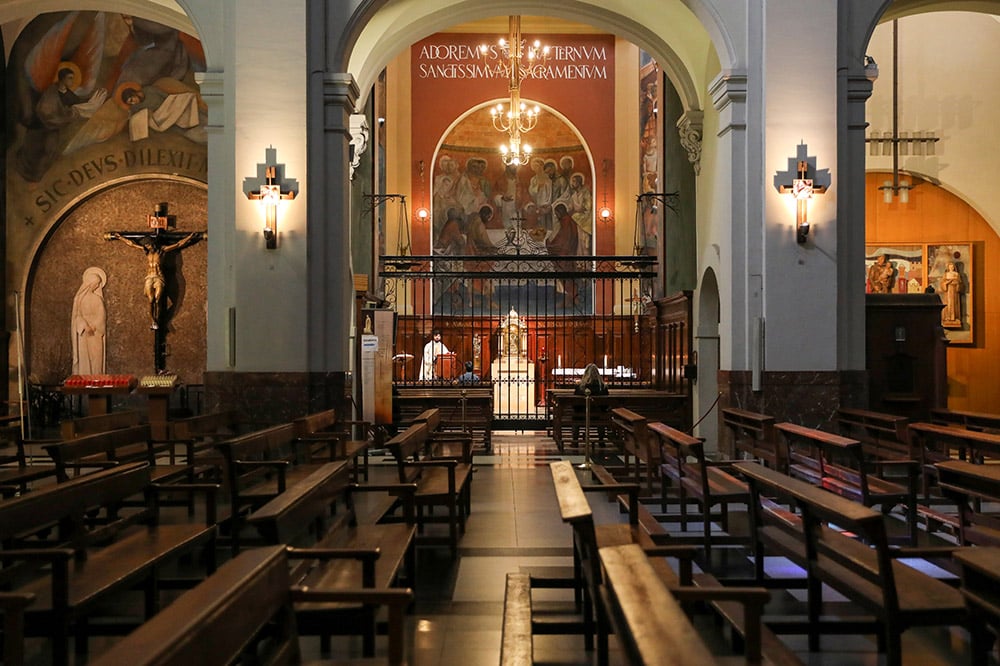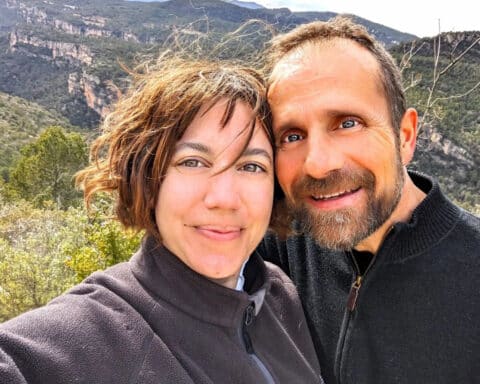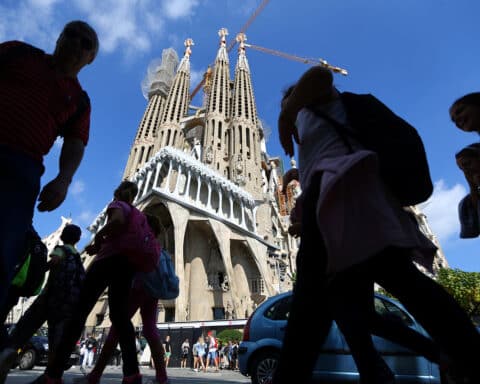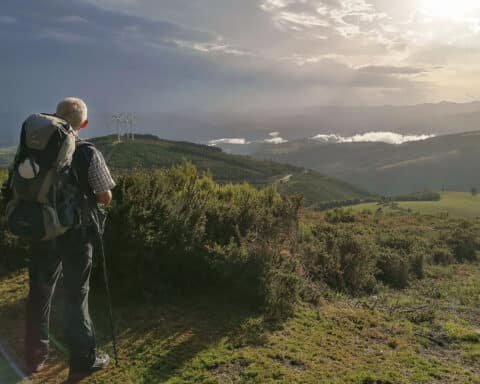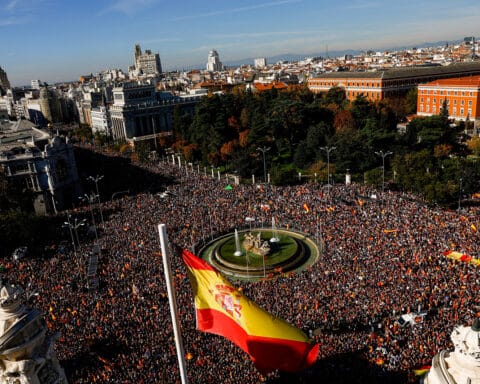As of March 29, more than 6,600 people in Spain have died from the effects of the coronavirus — the second most fatalities in the world (only behind Italy). In Madrid, the city in Spain most affected by COVID-19, funeral homes alone cannot keep up with the number of deaths. As an extraordinary measure, in this city, those killed by the virus are being deposited in ice skating rinks, which are now being used, in the most dignified way possible, as collective morgues. The cold of this space allows the conservation of the bodies while they wait to be buried or cremated.
Spain is experiencing a dystopia. Thousands of people have died without the physical presence of their loved ones, and worse, if possible, they will not be able to receive, for the moment, a traditional funeral. That is because funerals are not celebrated, neither for them nor for any person who dies these days. There are ceremonies where only two loved ones can attend in order to avoid crowds. As there are not enough rooms in the funeral parlors, the rest are waiting in the Ice Palace.
I know that the sick are not dying alone; there are priests in hospitals, risking their lives to bring comfort and words of hope to the sick, carrying the sacraments, the very presence of Christ: Eucharist, confession, anointing of the sick and even baptisms.
Corporeity of the sacraments
Father Javier Alonso, one of the five chaplains of the public hospital Clínico San Carlos, believes that his work has not changed much on a spiritual level. “I continue to carry the sacraments and words of comfort,” he said. What has changed is the exposure to the infection and the frequency with which the patients who receive the anointing do, indeed, die.
“The first time I went to visit a patient with the COVID-19, I felt as if I was going into a battle, expecting to find the enemy head-on,” Father Alonso said. “And what I saw was the usual: a dejected man waiting in his bed to hear about God.”
Father Alonso has been able to feel the human being’s need for physical contact and the corporeity of the sacraments: “Despite the fact that plenary indulgence has been granted to all coronavirus patients, people continue to require the physical presence of the priest and the sacrament. When I touch the sick with that double glove, it is the Lord who touches them.”
He experiences moving stories every day, such as the case of a woman who, after receiving the anointing of the sick, on the second floor of the hospital, asked the priest to go and give it to her husband, who was on the sixth floor. “Even though four floors separate them, they are still united by marriage.”
The priest has the opportunity to also live with the real superheroes, those who risk their lives so that others live: the health-care workers. Their responsibility and vocation is such that the main reason they avoid being infected is so as not to infect others, but above all, to be able to continue helping and not to be sent home in quarantine. The latest reported numbers say that more than 5,400 health workers have already been infected.
Father Alonso says with admiration that “the workers are very professional. They are leaving everything for the cause; they don’t stop.” But they are at the limit of their strength and emotions. “If you stop to ask them how they are, they break into tears,” he admitted.
‘My great gift, the family’
Pedro Alfaro, a musician and father of four children, was one of the first people to be sent home after having been healed from the coronavirus.
“My family, my friends and faith have kept my hope, and of course, seeing how the doctors fought,” Alfaro said.
He turned 40 years old while in hospital confinement. That day, he received videos of his loved ones, a cake from the health-care workers and the prayers of many, including his sister, a nun.
“I felt supported and covered,” he said. “You can see the light and the joy in a dark situation.”
Pedro is now home with his wife and children. He remains in isolation, but now with his own.
“You feel grateful, like when you recover something that was far away,” Alfaro said. “What I have recovered is my great gift, the family.”
The suffering of those who stay home
This is how Catholics in this world cope with the situation, the world of the infected, that of the hospital, that of those who are surrounded by people in cold robes, but who have now become the warmest and most human contact of their lives. The rest of us Spaniards have been locked up at home for weeks, seeing the same walls daily and the same faces. We fight other battles: the battles of coexistence, of encounters and disencounter with others, our loved ones and with ourselves — and if we are lucky and we are attentive — encounters with the other.
It is hard not to be able to leave home, but it is harder to stay in it if you have lost the income to keep it. How does one look for work from the confinement of one’s home? How does one accompany a sister who has given birth and who cannot and will not meet her baby in the next weeks? What if my father contracts COVID-19, can I say goodbye? What if a loved one has already died, and I’m still at home, locked up with no one to mourn with?
Cecilia Castañera is a doctor and, for the past 28 years, a lay religious with Regnum Christi. After spending a few days caring for her 97-year-old mother, she received the news that she herself was positive and that she had probably infected her mother, who is not being tested because there are not enough tests. Simply, if she has symptoms, it is assumed that she has the virus and needs to be isolated at home unless she has respiratory problems, in which case she is to be taken to the hospital.
Days after learning that Castañera was positive, her sister, who lives in another city, and whom she cannot visit because of the quarantine, was diagnosed with metastasis.
“For the first time in my life, I can experience the mystery of the cross, the mystery of love and pain,” Castañera said. “It is a mystery of greatness and beauty that has a transforming capacity, the source of life. And in the midst of this pain, pain to the bones, I only perceive love and pain, a total humanization. ”
Gemma Sobrecueva’s faith and hope are also being tested. She is the mother of Macarena, Felipe and Juan. Juan is 6 months old and was born with a fairly serious genetic condition. They had been waiting for months for a delicate open-heart operation. Now it has had to be postponed, among other things, because his cardiologist has been infected. She shared that it “is not possible to deny the fear that comes from seeing so much death, neither the compassion, but above all, a hope prevails, which is not our merit to maintain. Since Juanito was born, God’s grace has been the one who has sustained us, knowing we are in the hands of a Father who loves us, who acts mysteriously, yes, but who loves us and who does not abandon us.”
Lent is of ‘divine matter’
Holy Week in Spain is internationally famous. There are processions where people carry large floats and hold stage performances throughout the country. Obviously all these traditions have had to be canceled. And although it is at another level of detachment and frustration with this quarantine, the absence and pain are no less real and authentic for those who wait all the year to attend, but even more so for the people who spend months preparing them. This is the case of José Carlos Villamuelas, the actor who represents Jesus Christ in La Pasión de Villanueva de Bogas, a small town in Toledo, which after 22 years of performances has become an iconic production.
“Today, in Madrid, without being able to see my family and neighbors, and with an aunt in the ICU, I think there is something that is becoming clear to me: To live Lent, you have to get rid of everything superfluous. Perhaps the [performance] is not superfluous because it helps many people to live Holy Week, but it is true that stopping the activity is allowing me to live Lent with a deep meaning,” Villamuelas said. “This situation questions us, threatens our customs and also confronts us with the reality of death day by day. We are learning the lesson of humility, limit, fragility and human strength. It seems that everything will get worse in the coming days, [though] the end is not seen.”
He said that hope lies in Easter — the Resurrection.
As Father Alonso said, “In this Lent, they are no longer purposes that you set for yourself; it is what appears in reality, and what appears, in reality, is divine matter.”
The world stopped for us to love
Our whole self is being tested: our gaze, our generosity, our endurance, all our muscles. I read a publication of a psychiatrist friend who said, “COVID-19 is the cause of the disease, but not of fear.” That comes from another source, but we could say that it spreads just as easily. The challenge of acknowledging that fear only reigns if we allow it to. Who reigns in my house? What lord am I serving? And this manifests itself in every detail: the attitude with which you wake up, whether or not you make your bed, if you decide to change your children out of their pajamas and dress them up beautifully so they can participate in Sunday Mass through television. In all those details, we look God in the eye and say, “You continue to reign in my life, not the virus.” Or better yet: “Starting today and forever, only you will reign.”
And God is also committed to his kingdom. He has promised to dwell in us. Letting him reign, when we are locked up, demands many things. The deepest and most realistic advice I’ve ever heard about the coexistence that is now required comes from a cloistered nun. Who better than them to enlighten us right now? She said: “The only ground that really belongs to you is yourself: your thoughts, words and emotions. … From love, you will obtain understanding and empathy, desire to give and gratitude when receiving. Respect, accept fragility, de-dramatize, live and let live.”
The wonder of this self-isolation — of how the world has seemed to suddenly stop — is that we are not losing our freedom, our vocation to love. Nobody has taken that from us. We are losing a lot; some lose with each passing second, but our choice to love is stronger and freer than ever. The earth stops, and when the man closes himself in, he discovers that he can love, and he loves.
These past several Sundays, the Spaniards have not been able to receive sacramental Communion, and by participating in the Mass through online broadcasts, they offer a spiritual communion. I think that term condenses what we are experiencing: spiritual communion. Physical loneliness, isolation, but community and union in God and with God.

